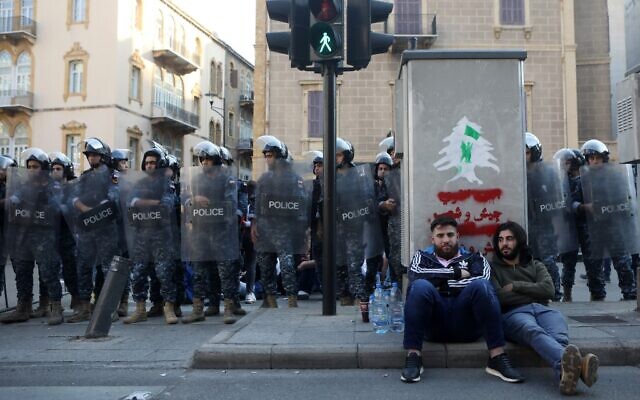“The people and the politicians are living on two different clouds,” said Steven, a 34-year-old from the Bekaa Valley who was blocking a key flyover in Beirut.
“The president hasn’t even called on parliament to discuss the formation of a new government,” he added.
“Nobody is listening to us.”
Consultations between the president and parliamentary blocs were expected to begin on Tuesday — one week after the government’s resignation.
They are to look into who would lead the next government as well as the distribution of cabinet posts among established parties and independents.
Yusef Fadel, a demonstrator in central Beirut, ruled out the possibility that the next government would include members of established parties.
“I reiterate, we are demanding a technocratic government and not a techno-partisan one,” said the 25-year-old who holds a masters degree in finance but remains unemployed.
“We need new blood.”
– Cross-sectarian –
Lebanon’s largely sectarian political parties have been flat-footed by the cross-communal nature of the demonstrations.
Waving Lebanese national flags rather than the partisan colours normally paraded at demonstrations, protesters have been demanding the resignation of all of Lebanon’s political leaders.
Such was the scene on Sunday, when tens of thousands took to the streets across the country.
“All of them means all of them,” they chanted, calling for political leaders from all sectarian stripes to step down.
Draped in white sheets, three demonstrators staged a mock execution of the grievances that pushed them down into the street.
Nooses around their limp necks, they bore signs referring to corruption, sectarianism, and the 1975-1990 civil war.
Sunday’s mobilisation followed a large rally organised by Aoun supporters in front of the presidential palace.
Aoun’s supporters said they backed the overall demands of anti-graft protesters, but insisted the president was the only man able to bring about reforms.
The president has said the members of the next government should be picked on merit, not political affiliation, seemingly endorsing protester demands for a technocratic government.
On Sunday, he urged the Lebanese to rally behind a roadmap to tackle corruption, redress the economy, and put together a civil government.
But he is also thought to be insisting on keeping his son-in-law Gebran Bassil, who is Lebanon’s foreign minister and one of the most reviled figures among protesters, in government.
AFP, Yahoo


Leave a Reply
You must be logged in to post a comment.